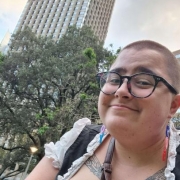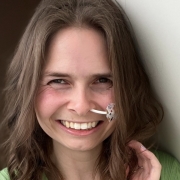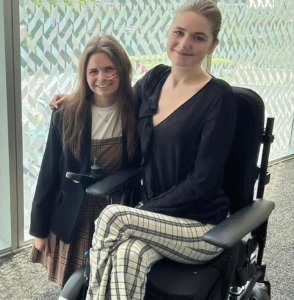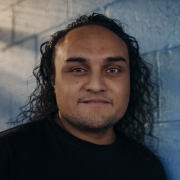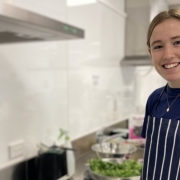Neo Kenny – helping rainbow youth connect
For Youth Week Aotearoa, Alice Mander interviewed young volunteers to learn about their work, motivations, and observations about volunteering in up and coming generations. Neo and Alice sit down to talk about healing, burnout, and what volunteering can mean for young rainbow people.
From our conversation, Neo Kenny (ia/he/him) strikes me as one of those unique advocates who maintains both an unapologetic strength with a unique kindness and generosity of spirit. This makes him the perfect person for his current role as Volunteer and Community Engagement Coordinator at InsideOUT Kōaro, as well as volunteering as a leader of peer support groups at The Peer Tree.
In what’s becoming a theme in these stories, Neo’s volunteering journey began as a beneficiary of the work of these organisations. InsideOUT Kōaro’s vision is for all rainbow young people in Aotearoa New Zealand to have a sense of safety and belonging in their schools and communities. For instance, InsideOut helped Neo establish a Queer Straight Alliance (QSA) at ia’s High School. The Peer Tree offers a community for young people with experience of mental health distress, and Neo began his journey with them as a group member. “I guess I just sort of wanted to give back… or help people in the way that I have been helped. I think that’s why I started both, and then I just fell in love with all of it.”
Now, as a volunteer coordinator himself, Neo has a unique insight into what it means to volunteer for young rainbow New Zealanders. “The number one reason that people give when volunteering, and when I ask them if they have a goal, is that they want to connect with the community more. I think that really speaks to the isolation that can come with being rainbow.”
Certainly, for youth with marginalised identities, community can be hard to come by. One study found that one in six rainbow youth did not feel safe at school, with two-thirds reporting suicidal thoughts in the last year. A large number have reported moving towns or cities in order to feel safer as a young queer person. Despite this, the same study found high levels of pride in rainbow youth, with three in five participants reporting that it is important for them to be politically active in the rainbow community.
Activism and volunteering
When asked whether rainbow youth may have unique motivations to volunteer, Neo reflected that volunteering as a rainbow person is often “very personal”. He says, “I think a lot of the time for young people these days, activism and volunteering is closely connected… In a way, volunteering is more motivated by worry. Most people who are volunteering, for instance for climate related causes, are doing it out of worry, because the climate is screwed. A lot of people will be like, ‘Oh I see things are getting bad for this group, I’m going to help where I can.”
Neo believes that volunteering within your community can be a strong source of empowerment, but that the sense of urgency and responsibility which comes with it can carry its own risks. “I always say that it’s really hard to work as a volunteer or in a role that’s connected to who you are, because there’s a lot more chance for that emotional stuff to come up, and you really have to manage that for yourself,” Neo explains.
Burnout and wellbeing
Burnout and its debilitating effects is something most young volunteers can relate to, especially those who work in more political or advocacy-based roles . When you’re emotionally and personally connected to the community you volunteer for, it’s very difficult to create boundaries and stick to them. Every person you come into contact with reminds you of who you used to be, and your desire to give back can end with having nothing left to give. Not only is this harmful for individual volunteers, but also for the longevity of the causes or organisations they are giving time to.
For Neo, it’s important to recognise the signs of burnout and recommends having plans in place should it come up. “I have a list of things that bring me comfort, like food I like, favourite TV shows, favourite movies… As well as having people who are willing to call you out when you are getting close to it [burnout]. I’m really bad at recognising it myself, so I outsource it.” Organisations can also do their part. For instance, InsideOUT Kōaro makes it clear to volunteers that “health comes first”, and allows volunteers to do as much or as little as they feel up for, with no minimum hour expectations.
The solution to burnout is also societal. Both Neo and I have noticed that when we ask our friends how they’re doing – many of them youth volunteers themselves – their instinctive response is: “I’m good, really, really busy though!”. Being busy has almost become a source of pride in and of itself. “There needs to be an attitude shift towards being busy. Can you imagine, ‘How are you doing?’, ‘Oh, just chill’”, Neo laughs, “Whenever someone tells me that they’ve been doing nothing I think, ‘That’s awesome!’. Someone the other day asked how I was, and I said I was stressed. They said, ‘Me too… Actually, no I’m not. The thing I’m most stressed about is getting my library book back in time’. I’m like, that’s great! I love that for you.”
If the personal is political, as the slogan goes, healing ourselves is just as much an act of rebellion as healing our communities. For both Neo and myself, volunteering has allowed us to turn parts of our identity, once stigmatised by society – whether that be gender diversity, experiences of mental distress, or disability – into a source of strength, and a way to help others like us. However, within that, Neo believes there is “always enough time to rest and take care of yourself”. This may be difficult for volunteers in advocacy based roles, in which the urgency of ‘the cause’ can seem bigger than ourselves. However, a movement can only be as healthy as the people within it. As New York Times columnist Tim Steider said, “Idleness is not just a vacation, an indulgence or a vice; it is as indispensable to the brain as vitamin D is to the body, and deprived of it we suffer a mental affliction as disfiguring as rickets.”
Ultimately, it was this potential healing power of volunteering that Neo wanted to end this interview on. “Volunteering can be life changing… I would be such a different person if I hadn’t had the volunteering opportunities that I’ve had, and I wouldn’t have a job! Or I would have a very different job. For me, volunteering has been a positive source of healing as well.
“At times, when I maybe haven’t had anything else on, and I’ve felt depressed or whatever, having a space where I can actually go and materially help other people has been really important to me. There have been times where the thought of going to a peer support group and leading it has been the hardest thing I’ve ever done, but once I get there, and I talk to people, and share what I’m going through, other people might say, ‘Oh, I’m going through that too’. The community connection, and being able to help people is something that is so important, so healing, and so therapeutic.”

